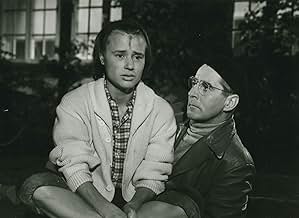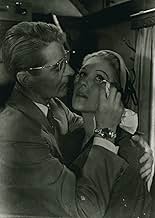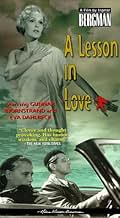VALUTAZIONE IMDb
7,0/10
3828
LA TUA VALUTAZIONE
Aggiungi una trama nella tua linguaAfter a 15-year marriage, the spouses are going to divorce, but suddenly find out that their feelings have not vanished yet.After a 15-year marriage, the spouses are going to divorce, but suddenly find out that their feelings have not vanished yet.After a 15-year marriage, the spouses are going to divorce, but suddenly find out that their feelings have not vanished yet.
Birgitte Reimer
- Lise
- (as Birgitte Reimers)
Georg Adelly
- Bartender
- (non citato nei titoli originali)
Ingmar Bergman
- Narrator
- (non citato nei titoli originali)
- …
Julie Bernby
- Guest at Wedding
- (non citato nei titoli originali)
Henning Blanck
- Guest at Wedding
- (non citato nei titoli originali)
Tor Borong
- Gentleman
- (non citato nei titoli originali)
Yvonne Brosset
- Dancer in Bar
- (non citato nei titoli originali)
Olle Ekbladh
- Guest at Wedding
- (non citato nei titoli originali)
Trama
Lo sapevi?
- QuizCameo: When the doctor (Gunnar Björnstrand) enters the train a tall lean man in a beret reading a newspaper is standing in the doorway. This is no one less than Ingmar Bergman himself.
- BlooperDuring the conversation between David and his wife by the microscope, the shadow of the microphone can be seen on the wall for a large part of the scene.
- ConnessioniFeatured in Stjärnbilder (1996)
Recensione in evidenza
Bergman really liked this reflecting back on summer thing, huh?
After Summer Interlude, Summer with Monika, and Wild Strawberries, it's a well he obviously found some merit in. Here we see it again in a story of a husband and wife taking a train to Malmo, Sweden (and then on to Copenhagen on a ferry) as they reflect back on their marriage.
Tonally, the movie has much more in common with Smiles of a Summer Night than the other three. It's a farce, through and through, and it's rather delightful. However, it's not really Bergman's strength, so while he makes the film entertaining and quite funny at times, he can't commit as fully to the concept as he might like. His instinct tend more towards darker ruminations, which ends up creating some tonal shifts that don't really help the movie at times.
And yet, the movie is still, largely, quite entertaining.
We begin with the dissolution of an affair between David and his lover, the much young Susanne. He's concerned that he's going to lose his family and that his wife will divorce him. The fight ranges from comic to very serious and ends with Susanne unhappily dumped. David, a gynecologist, skips out the rest of his day to catch a train. There he meets a man and a woman. The man, a salesman, bets David that he can kiss the woman before the next stop. After he gets a good slap, we remain with David and the woman and slowly realize through their bit of foreplay that the woman is David's wife, Marianne.
They go back and forth about whether their mutual affairs will continue and whether Marianne will divorce him or not. All through this, the two reflect back on different stages of their marriage, including memories around their children and his father. The memories move from extremely bitter (when Marianne discovered David and Susanne in a hotel together) to their happiest (just the mere summer before when they celebrated David's father's 73rd birthday together). As they spend time together, their memories become warmer towards each other.
The movie ends with a purely farcical display of David igniting Marianne's jealousy in a dingy bar by kissing a strange women (heavily implied to be a prostitute). A slap fight ensues and David drags her out. We see a really funny long shot as the two comically walk up and down a street, each trying to wrangle the other in their own ways. The very last shot is a cheeky moment as a cupid walks up to their hotel room and leaves a sign on the door that repeats the movie's title.
The movie really is quite amusing from beginning to end, but again, the tonal shifts that occur don't help the movie out. It's far from Bergman's best, but it really is quite delightful.
After Summer Interlude, Summer with Monika, and Wild Strawberries, it's a well he obviously found some merit in. Here we see it again in a story of a husband and wife taking a train to Malmo, Sweden (and then on to Copenhagen on a ferry) as they reflect back on their marriage.
Tonally, the movie has much more in common with Smiles of a Summer Night than the other three. It's a farce, through and through, and it's rather delightful. However, it's not really Bergman's strength, so while he makes the film entertaining and quite funny at times, he can't commit as fully to the concept as he might like. His instinct tend more towards darker ruminations, which ends up creating some tonal shifts that don't really help the movie at times.
And yet, the movie is still, largely, quite entertaining.
We begin with the dissolution of an affair between David and his lover, the much young Susanne. He's concerned that he's going to lose his family and that his wife will divorce him. The fight ranges from comic to very serious and ends with Susanne unhappily dumped. David, a gynecologist, skips out the rest of his day to catch a train. There he meets a man and a woman. The man, a salesman, bets David that he can kiss the woman before the next stop. After he gets a good slap, we remain with David and the woman and slowly realize through their bit of foreplay that the woman is David's wife, Marianne.
They go back and forth about whether their mutual affairs will continue and whether Marianne will divorce him or not. All through this, the two reflect back on different stages of their marriage, including memories around their children and his father. The memories move from extremely bitter (when Marianne discovered David and Susanne in a hotel together) to their happiest (just the mere summer before when they celebrated David's father's 73rd birthday together). As they spend time together, their memories become warmer towards each other.
The movie ends with a purely farcical display of David igniting Marianne's jealousy in a dingy bar by kissing a strange women (heavily implied to be a prostitute). A slap fight ensues and David drags her out. We see a really funny long shot as the two comically walk up and down a street, each trying to wrangle the other in their own ways. The very last shot is a cheeky moment as a cupid walks up to their hotel room and leaves a sign on the door that repeats the movie's title.
The movie really is quite amusing from beginning to end, but again, the tonal shifts that occur don't help the movie out. It's far from Bergman's best, but it really is quite delightful.
- davidmvining
- 20 nov 2019
- Permalink
I più visti
Accedi per valutare e creare un elenco di titoli salvati per ottenere consigli personalizzati
- How long is A Lesson in Love?Powered by Alexa
Dettagli
- Tempo di esecuzione1 ora 36 minuti
- Colore
- Mix di suoni
- Proporzioni
- 1.37 : 1
Contribuisci a questa pagina
Suggerisci una modifica o aggiungi i contenuti mancanti

Divario superiore
By what name was Una lezione d'amore (1954) officially released in India in English?
Rispondi






























